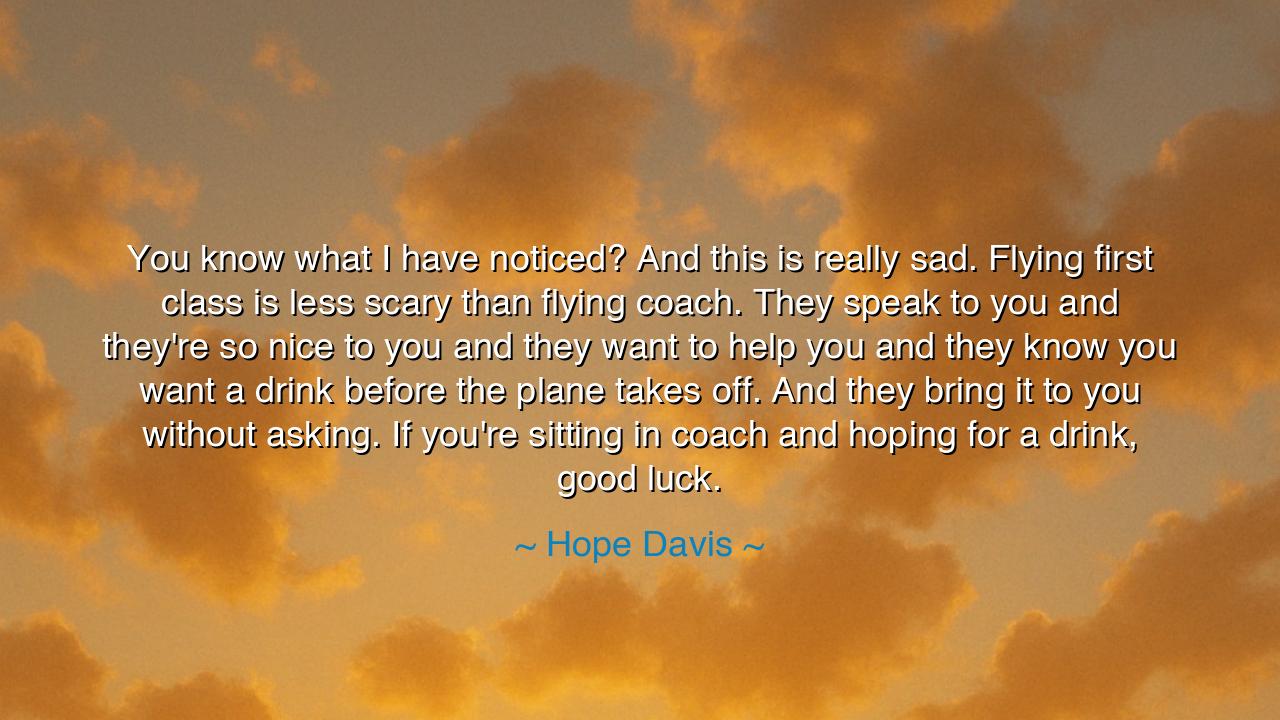
You know what I have noticed? And this is really sad. Flying
You know what I have noticed? And this is really sad. Flying first class is less scary than flying coach. They speak to you and they're so nice to you and they want to help you and they know you want a drink before the plane takes off. And they bring it to you without asking. If you're sitting in coach and hoping for a drink, good luck.






The words of Hope Davis, “Flying first class is less scary than flying coach... If you're sitting in coach and hoping for a drink, good luck,” seem at first to be a lighthearted jest about air travel, yet beneath their humor lies a mirror held up to modern inequality, human nature, and the quiet sadness of a world divided by privilege. Her tone is casual, yet her observation is profound. For what she describes is not merely the difference between two sections of a plane, but the division of comfort and neglect, of recognition and invisibility, that echoes through all levels of society. In a few sentences, she captures the ancient truth that how we treat others reveals what we truly value.
In this remark, Davis unveils the silent truth of social hierarchy in the simplest of settings. On the same aircraft, bound for the same destination, two worlds exist: one of care and abundance, and another of waiting and weariness. In first class, the traveler is greeted with smiles, warmth, and attention, as though their comfort were sacred. In coach, the traveler is tolerated, processed, and forgotten until called upon. What she calls “sad” is not the difference in luxury, but the difference in dignity. For she perceives that the same human being, with the same fears and desires, receives compassion or neglect not by merit, but by status. It is a small reflection of the greater imbalance that pervades our civilization.
In the ancient world, philosophers warned of this very disease of the human spirit—the tendency to worship status and forget humanity. The Stoic Epictetus, born a slave, once said, “Remember that you are but a passenger in the ship of life; rank means nothing when the storm comes.” His words echo through Davis’s quote, for in the air, where all souls are equally fragile beneath the sky, the illusion of superiority still reigns. The one in luxury forgets their fear; the one in scarcity is left to face it alone. This, she says, is the tragedy—that kindness, which should be universal, has become a commodity, reserved for those who can pay for it.
Consider the story of the Titanic, a grand ship divided by class. When it sank into the cold Atlantic, fate made no distinction between first class and steerage. Yet even in disaster, privilege endured longer—lifeboats were filled first with the wealthy, while hundreds of the poor perished below deck. This tragedy was not born of cruelty, but of habit—of a world trained to value one life above another. Hope Davis, through her jest about flying, touches upon that same enduring blindness: the ease with which humanity forgets equality in the presence of comfort.
The “fear” she mentions—“flying first class is less scary than flying coach”—is symbolic as well. Fear, in truth, is not lessened by distance from the ground but by the feeling of being seen and cared for. In first class, attendants speak to you by name, offer comfort, and assure your safety. In coach, you are one among many, unseen and unheard. Thus, the fear of flying becomes a metaphor for the fear of insignificance—the fear that one’s life, one’s presence, one’s being, matters little in the eyes of the world. And what she finds “sad” is not that people pay for comfort, but that compassion itself seems to require a price.
Her words also carry a quiet call to self-awareness. She is not condemning the attendants, nor mocking the wealthy. Instead, she is observing the fragile human tendency to give kindness selectively—to extend warmth where it is rewarded, and withhold it where it is not. The ancients taught that virtue lies in constancy, in treating every soul with equal grace, whether emperor or beggar. True nobility, they said, is not in privilege but in conduct. When kindness flows only upward, civilization decays from within. When it flows freely to all, it becomes the foundation of harmony.
So let this teaching be passed down: Do not reserve compassion for those who can return it. Whether you sit in the front of life’s plane or the back, strive to be one who sees others, who speaks gently, who serves not because it is expected, but because it is right. The divisions of wealth and comfort will always exist, but the divisions of the heart are ours to heal. For when kindness is given equally—to the first class and the forgotten alike—then the world itself becomes less frightening, less lonely, and less “sad.” And in that moment, we rediscover what Hope Davis, with subtle humor, revealed: that true luxury is not being served, but learning to serve others with grace.






AAdministratorAdministrator
Welcome, honored guests. Please leave a comment, we will respond soon